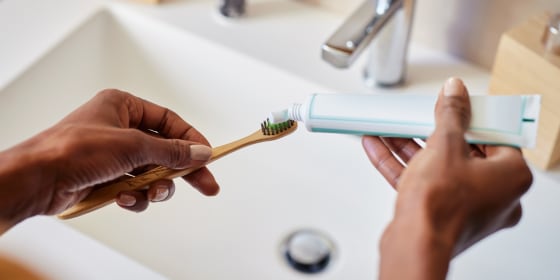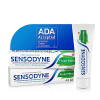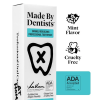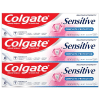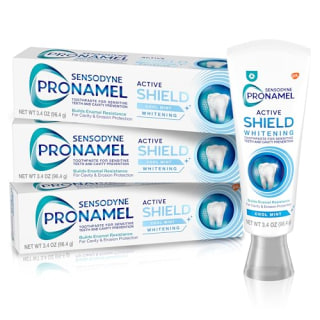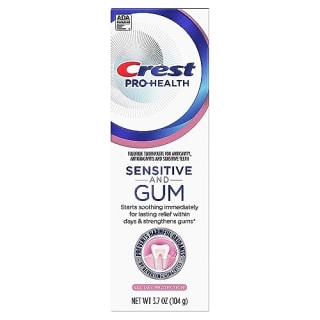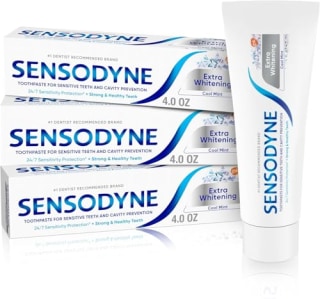You shouldn’t experience tooth pain when you eat a spoonful of ice cream, take a sip of hot coffee, inhale cold air on a winter day or brush and floss. If you do, there’s a good chance you have sensitive teeth. It’s a common condition, but it can be uncomfortable and disruptive to your day-to-day life, says Dr. Ana Carolina Botta-Maltese, an associate professor of general dentistry at Stony Brook School of Dental Medicine.
One of the easiest ways to manage tooth sensitivity, also called dentin hypersensitivity, is to use specialized oral care products. Toothpaste for sensitive teeth, one of the easiest options to incorporate into your routine, has ingredients that reduce pain and strengthen enamel with continued use, unlike standard anticavity toothpaste, which just cleans.
If you’re considering using toothpaste for sensitive teeth, I spoke to dentists about everything you should know before buying a tube. Below, they break down what’s in it and how it works, plus what you can do to prevent future irritation.
SKIP AHEAD How I picked the best toothpastes for sensitive teeth | The best toothpastes for sensitive teeth in 2025 | What causes tooth sensitivity? | How to reduce tooth sensitivity | Why trust NBC Select?
Want more from NBC Select? Sign up for our newsletter, The Selection, and shop smarter.
How I picked the best toothpastes for sensitive teeth
If you have sensitive teeth, experts suggest considering the following factors while shopping for toothpaste, all of which I took into consideration while choosing options to recommend.
- Desensitizing and enamel strengthening ingredients: Standard fluoride toothpaste just cleans teeth and helps prevent cavities, but toothpaste for sensitive teeth has additional ingredients that gradually block nerve pain, relieve discomfort and strengthen enamel (the outer shell of teeth), says Dr. Chris Salierno, the chief dental office at Tend. It’s commonly made with potassium nitrate, stannous fluoride and/or arginine, for example — learn more about what these ingredients, and others like them, in the FAQ section below.
- Texture: All toothpaste is semi-abrasive to scrub off grime and polish teeth, but toothpaste for sensitive teeth is even less abrasive to prevent further enamel erosion, says Salierno.
- Fluoride: Dentists only recommend using toothpaste made with fluoride, an ingredient that helps prevent cavities and reduce bacteria growth in the mouth. There are three types of fluoride, all of which are equally effective at fighting cavities: stannous, sodium and sodium monofluorophosphate. Stannous fluoride also has sensitivity-relieving benefits, which is why you’ll often see it in toothpaste for sensitive teeth.
- Sodium lauryl sulfate: Commonly called SLS, this ingredient acts as a detergent for teeth and makes toothpastes foamy. People can be sensitive to SLS — if you are, look for a SLS-free option.
- ADA Seal of Acceptance: The American Dental Association’s Seal of Acceptance is the gold standard when it comes to oral care products like toothpaste. When you see the seal on packaging, it means the brand submitted evidence to the organization showing that its product meets specific safety and efficacy standards. That doesn’t mean dental care products without the ADA’s seal are ineffective — it just means the brand hasn’t submitted their products for the organization to evaluate.
- Flavor and texture: Toothpaste comes in various flavors and textures, both of which are personal preferences, so buy what you like best.
The best toothpastes for sensitive teeth of 2025
All the toothpastes below are specifically formulated for sensitive teeth using ingredients dentists recommend looking for. Each toothpaste is made with fluoride, and several are ADA-accepted — I noted which ones.
Best overall: Sensodyne Toothpaste
- ADA-accepted
- SLS-free
- Recyclable carton & tube
- Made with artificial dyes
Sensodyne’s toothpaste has everything dentists recommend looking for while shopping: the ADA Seal of Acceptance, a non-abrasive fluoridated formula and potassium nitrate. NBC Select editor Lindsay Schneider always keeps a tube at home, and she constantly comes back to it after trying options from other brands. “When I use this toothpaste, I notice that it makes my teeth hurt less, especially when I’m whitening them,” she says. “It doesn’t have the mintiest or freshest flavor, but it cleans my teeth really well.” The toothpaste comes in a recyclable carton and tube.
Active ingredients: potassium nitrate, sodium fluoride | Texture: paste | Flavor: fresh mint
Best multi-benefit: Colgate Sensitive Toothpaste Complete Protection
- Gently whitens
- SLS-free
- Recyclable carton & tube
- Not ADA-accepted
In addition to reducing sensitivity, Colgate’s Complete Protection toothpaste strengthens enamel — once tooth enamel gets eroded, it’s gone for good, but you can fortify what’s left to prevent sensitivity from worsening, says Salierno. The toothpaste also fights tartar (hardened plaque) and controls plaque when you use it twice a day, according to the brand. It has a foamy texture since it’s made with SLS.
Active ingredients: potassium nitrate, sodium fluoride | Texture: paste | Flavor: clean mint
Best whitening: Sensodyne Pronamel Active Shield Whitening
- Gently whitens
- SLS-free
- Recyclable carton & tube
- Not ADA-accepted
Dr. Erin Fraundorf, a dentist at Boca Orthodontic and Whitening Studio, says this is one of her favorite toothpastes. It helps make teeth more resistant to acids to prevent erosion, strengthens enamel and gently scrubs away surface stains so your teeth look brighter over time, according to the brand.
Active ingredients: potassium nitrate, sodium fluoride | Texture: paste | Flavor: cool mint
Best for gum health: Crest Pro-Health Gum and Sensitivity
- ADA-accepted
- Removes bacteria along gumline
- Prevents gum irritation
- Made with SLS
If you’re concerned about gum recession, which can lead to tooth sensitivity, try this ADA-accepted toothpaste from Crest. With regular use, it helps reverse gingivitis, a form of gum disease that causes irritation, by dissolving and lifting away harmful bacteria along the gumline, according to the brand.
Active ingredients: stannous fluoride | Texture: paste | Flavor: mint
Best for enamel: Made by Dentists Enamel Rebuilding Professional Toothpaste
- ADA-accepted
- SLS-free
- Helps remineralize enamel
- Nothing to note at this time
I don’t have particularly sensitive teeth, but it’s something I worry about because my enamel is on the weaker side, so I use Made by Dentists’ Enamel Rebuilding toothpaste as a preventative measure. It has nano-hydroxyapatite in its formula, which works with fluoride to remineralize teeth and make enamel stronger, according to the brand. The toothpaste is SLS-free, so it’s not foamy, which I prefer, and it doesn’t have any artificial dyes or flavors. It comes in a recyclable tube.
Active ingredients: potassium nitrate, sodium fluoride | Texture: paste | Flavor: fresh mint
Editor’s pick: Sensodyne Extra Whitening Toothpaste
- Gently whitens
- SLS-free
- Recyclable carton & tube
- Not ADA-accepted
“I’ve always had really sensitive teeth, especially to cold, and I was nervous to use whitening treatments because I worried that they might make the problem worse,” says NBC senior social media editor Rosalie Sparaco. “Having a toothpaste that helps my teeth feel less sensitive to cold drinks and whitening is a win-win. I wish it was a slightly stronger mint flavor, but it still leaves my mouth feeling fresh.” This toothpaste also helps reduce tartar buildup, so your teeth feel extra clean and smooth after you use it, according to the brand.
Active ingredients: potassium nitrate, sodium fluoride | Texture: paste | Flavor: cool mint
What causes tooth sensitivity?
The exterior of your teeth are made from enamel, a tough, protective outer shell, says Botta. There’s dentin, a soft tissue with tiny nerve endings, beneath that shell. When enamel wears down, or your teeth chip or crack, dentin gets exposed. It’s easily irritated by cold air, pressure from brushing and flossing, and foods or drinks that are very hot, cold, sweet and acidic, says Botta. Once dentin gets irritated, you tend to feel a sharp, lingering pain and discomfort.
Fraundorf says the following factors most commonly lead to tooth erosion:
- Aggressive brushing and flossing
- Using a hard-bristled toothbrush
- Using abrasive toothpaste, like charcoal toothpaste
- Grinding or clenching your teeth
- Tooth decay and cavities
- Consuming acidic foods and drinks, like sports drinks, citrus fruits, tomatoes, coffee, soda and sparkling water
- Medical conditions like acid reflux and dry mouth
- Aging
Gum recession can cause tooth sensitivity, too. Plaque, a film made from bacteria, food and other debris, irritates your gums when it builds up on teeth. If you don’t remove it by regularly brushing and flossing, your gums can pull back from your teeth, exposing sensitive tooth roots, says Fraundorf. You may also experience tooth sensitivity if you have a cavity, or after dental work like fillings, crowns or teeth whitening treatments, but that’s usually temporary.
Anyone can develop tooth sensitivity over time due to the factors listed above, but some people are predisposed to it due to genetics or naturally having thinner enamel, says Salierno.
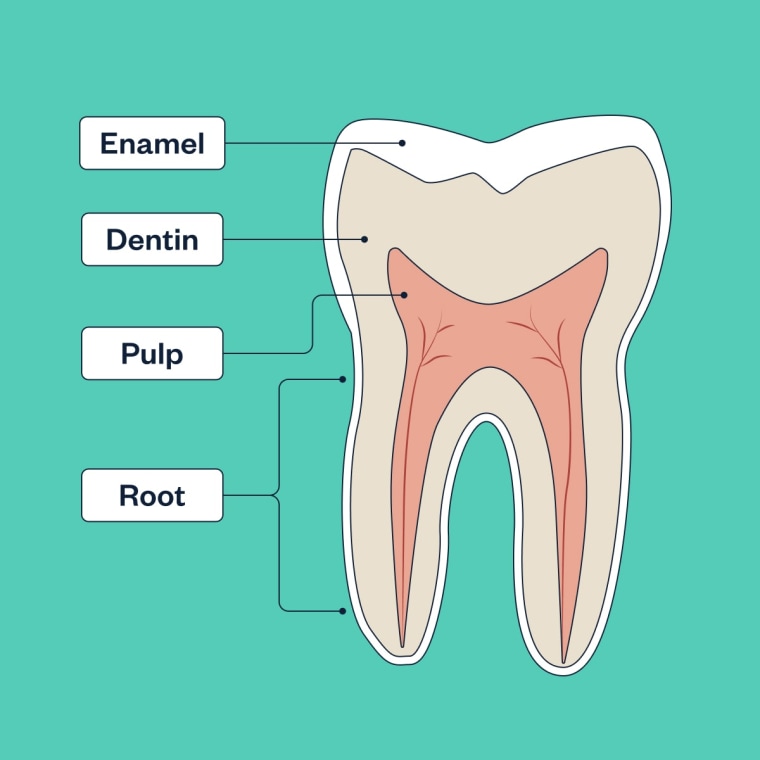
How to reduce tooth sensitivity
Using a specialized toothpaste isn’t the only thing you can do to reduce tooth sensitivity. Here are some do’s and don’t experts recommend. Also be sure to consult your dentist since they’re an expert on your health. Depending on how severe your sensitivity is, your dentist may recommend stronger treatments that aren’t available over-the-counter.
Do’s
- Use a soft-bristled toothbrush or an electric toothbrush with a pressure sensor, both of which can prevent additional enamel wear and gum irritation, says Fraundorf.
- Practice gentle brushing and flossing techniques. If your gums bleed after brushing and/or flossing, it’s a sign that you need to be more gentle while using those oral care products. Also, if the bristles on your toothbrush are frayed, it may be due to pressing them too hard against your teeth.
- Use a fluoride mouthwash to strengthen tooth enamel, says Salierno.
- Wear a nightguard if you grind your teeth, says Salierno.
- Regularly see your dentists for checkups so they can catch underlying issues that can contribute to sensitivity, like cavities and gum disease, says Fraundorf.
Don’ts
- Avoid using abrasive toothpastes that can wear down enamel, like those made with charcoal or strong whitening agents, including peroxides, says Fraundorf.
- Avoid a diet rich in highly acidic and sugary foods and drinks, like soda and citrus fruits, and be careful with anything that’s hot or cold, says Botta.
- Avoid at-home teeth whitening treatments, says Fraundorf. Instead, opt for a professional treatment at a dentist’s office so they can tailor it to your teeth and adjust it as necessary.
Meet our experts
At NBC Select, we work with experts who have specialized knowledge and authority based on relevant training and/or experience. We also ensure that all expert advice and recommendations are made independently and without undisclosed financial conflicts of interest.
- Dr. Ana Carolina Botta-Maltese is an associate professor of general dentistry at Stony Brook School of Dental Medicine.
- Dr. Erin Fraundorf is a dentist at Boca Orthodontic and Whitening Studio.
- Dr. Chris Salierno is the chief dental office at Tend.
Why trust NBC Select?
I’m a reporter at NBC Select who has covered oral care products for five years, including electric toothbrushes, floss, mouthwash and toothpaste for kids. To write this article, I spoke to three dentists about the symptoms and causes of tooth sensitivity, as well as how to shop for toothpaste for sensitive teeth.
Catch up on NBC Select’s in-depth coverage of tech and tools, wellness and more, and follow us on Facebook, Instagram, Twitter and TikTok to stay up to date.
